U1L2 - Scientific Knowledge
•Download as PPT, PDF•
2 likes•3,866 views
The document discusses how scientists choose their methods for investigations. Scientists plan methods to address specific problems, relying on available tools while being creative in their use. The type of work, whether experiments or fieldwork, depends on the subject being studied. Experiments allow controlling of variables while fieldwork involves observation of natural systems. A large part of scientific work involves understanding the variables at play.
1 of 12
Downloaded 35 times

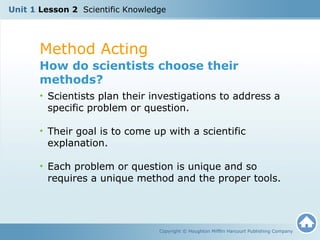
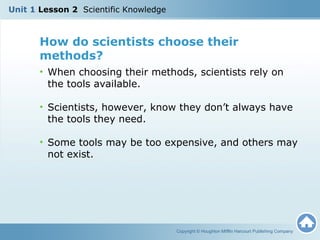
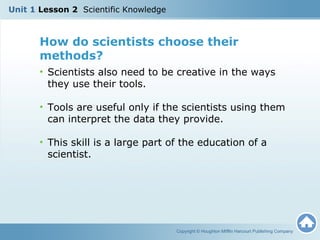
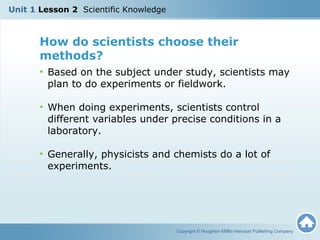
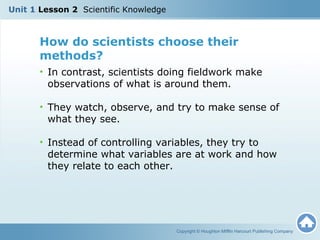
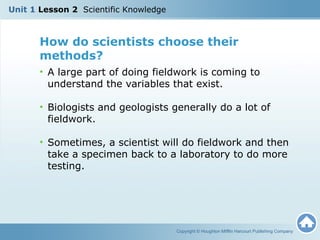
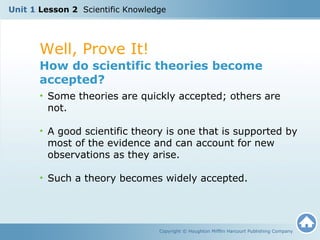
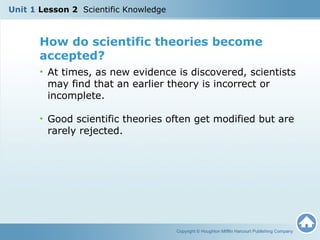
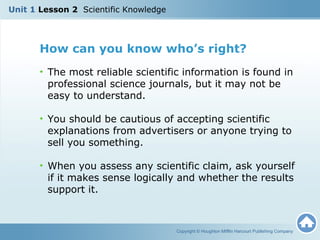
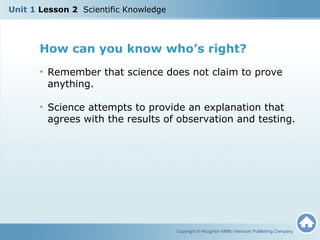
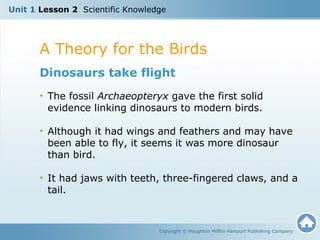
Recommended
U1L3 - Scientific Investigations by Lori Stroud, has 21 slides with 1708 views.



U1L3 - Scientific InvestigationsLori Stroud
21 slides•1.7K views
This document outlines the key components and characteristics of scientific investigations. It discusses that scientific investigations involve making predictions, developing testable questions, planning and carrying out experiments, collecting and analyzing quantitative data, identifying patterns, and comparing results to hypotheses. The document also notes that scientific investigations use variables that can be controlled or measured, and involve accurate record keeping. It describes characteristics of good scientific investigations as being well documented, controlling variables, repeating experiments, and undergoing peer review before publication.The Nature of Science by Gizzelle Pangilinan, has 45 slides with 20061 views.



The Nature of ScienceGizzelle Pangilinan
45 slides•20.1K views
(1) This document discusses science as a subject in education and the importance of teaching science processes. (2) It outlines various science processes like inferring, predicting, controlling variables, interpreting data, and experimenting that are essential for students to develop. (3) The document also emphasizes the abundance of instructional materials available to facilitate effective science teaching.Assessment in science education by David Geelan, has 11 slides with 15305 views.

Assessment in science educationDavid Geelan
11 slides•15.3K views
The document discusses the purposes and types of assessment for learning. It distinguishes between formative assessment, which is ongoing and used to promote learning, and summative assessment, which evaluates learning at the end of a unit. Both kinds of assessment are important for evaluating student learning and teaching effectiveness. The document also emphasizes using a variety of assessment strategies and making assessment itself a learning experience for students.What is the Nature of Science? by Reginald V. Finley Sr. M.Ed., has 27 slides with 29311 views.

What is the Nature of Science?Reginald V. Finley Sr. M.Ed.
27 slides•29.3K views
The document discusses the nature of science. It describes science as understandable, following consistent basic rules everywhere, and producing durable yet changing knowledge. Scientific inquiry uses evidence and facts to develop hypotheses and theories, which are continually tested through experimentation and observation. Well-established scientific theories represent our best current explanations but are still subject to revision. The scientific process aims to identify and avoid bias while building knowledge through self-correction.Nature,scope,meaning,function of philosophy in Education (https://www.youtube... by Tasneem Ahmad, has 9 slides with 28447 views.

Nature,scope,meaning,function of philosophy in Education (https://www.youtube...Tasneem Ahmad
9 slides•28.4K views
Philosophy of education plays an important role in providing direction to education. It is a method of approaching educational experience critically and comprehensively synthesizing facts from various fields. The scope of philosophy of education is concerned with problems of education like interpreting human nature, aims of education, and the relationship between education's various components. Philosophy of education performs functions like determining education's aims, harmonizing traditions, and providing vision to educational leaders. A teacher's philosophy guides the teaching process by informing their view of the learner, subject matter, instructional methods, and own behavior.Branches of philosophy by Muhammad Imran, has 20 slides with 3292 views.

Branches of philosophyMuhammad Imran
20 slides•3.3K views
Metaphysics, Epistemology, Axiology, Logic
Islamic metaphysics, Islamic Epistemology, Islamic Axiology,Nature of science for teaching by David Geelan, has 24 slides with 11221 views.

Nature of science for teachingDavid Geelan
24 slides•11.2K views
The document discusses several key aspects of teaching science:
1. Teaching science involves developing students' knowledge, skills, and attitudes to engage with science, not just transmitting content.
2. Students often come to science class with preexisting conceptions about phenomena, so teaching new concepts requires conceptual change from their initial ideas to the scientific view.
3. For conceptual change to occur, the scientific concept must be seen as intelligible, plausible, and fruitful to students. Gathering evidence through experiments allows students to compare their ideas to scientific explanations.Wheeler’s model of curriculum development by HennaAnsari, has 5 slides with 5850 views.

Wheeler’s model of curriculum developmentHennaAnsari
5 slides•5.9K views
NOTE:>>Correction in the title page its Wheeler’s model of curriculum development
not Wheel’s model of curriculum developmentMore Related Content
What's hot (20)
Realism and its Role in Education by writemind, has 30 slides with 125972 views.

Realism and its Role in Educationwritemind
30 slides•126K views
The document discusses different perspectives on realism and its role in education. It covers classical realists like Aristotle and Thomas Aquinas, modern realists such as Francis Bacon and John Locke, and contemporary realists including Alfred Whitehead, Bertrand Russell, Hilary Putnam, and John Searle. Realism in education aims to help students understand the material world through inquiry, science, and essential knowledge. Teachers play an important role in presenting curricula in a systematic, organized way to help students acquire the knowledge needed to survive.Realism by aneez103, has 19 slides with 39803 views.

Realismaneez103
19 slides•39.8K views
This document discusses different forms of realism as it relates to education. It defines realism as the view that there is a real world that exists independently of our perceptions. The main forms discussed are humanistic realism, social realism, sense realism, and neorealism. Humanistic realism focuses on education bringing human welfare and success. Social realism aims to promote working efficiency. Sense realism believes knowledge comes from the senses. Neorealism is more inclined toward science. The educational implications are that education should prepare students for real life, use objective teaching methods like observation, and encourage self-discipline.Educational research by Mukut Deori, has 18 slides with 23835 views.

Educational researchMukut Deori
18 slides•23.8K views
The document defines and discusses different types of educational research. It begins by defining research as a systematic process of investigation that uses specialized tools and procedures to solve problems. Educational research specifically aims to develop a science of behavior in educational situations to determine the most effective teaching methods. The document outlines that educational research is purposeful, objective, and concerned with solving problems through quantitative and systematic analysis of collected data. It then describes the main types of educational research as quantitative (experimental, quasi-experimental, correlational) and qualitative (survey, case studies, documentary analysis, ethnographic, historical, philosophical). Several specific methodologies like experimental research, quasi-experimental research, and correlation research are also defined.Progressivism by Terry Chan, has 18 slides with 41779 views.

ProgressivismTerry Chan
18 slides•41.8K views
This document discusses the educational philosophy of progressivism. It is grounded in pragmatism and focuses on real-world problem solving and individual development. Key aspects of progressivism include learning through experience, a dynamic view of knowledge, and sensitivity to individual learners' interests and styles. The document outlines how progressivism influences curriculum design, emphasizing methodology over content and outcomes. It also reviews critiques of progressivism and its interpretation and implementation in various works.Curriculum Evaluation by valarpink, has 41 slides with 293862 views.

Curriculum Evaluationvalarpink
41 slides•293.9K views
Evaluation is the process of collecting data on a programme to determine its value or worth with the aim of deciding whether to adopt, reject, or revise the programme. The public want to know whether the curriculum implemented has achieved its aims and objectives; teachers want to know whether what they are doing in the classroom is effective; and the developer or planner wants to know how to improve the curriculum product.Idealism Realism Pragmatism by drburwell, has 21 slides with 25315 views.

Idealism Realism Pragmatismdrburwell
21 slides•25.3K views
The document discusses three philosophies of education: idealism, realism, and pragmatism. Idealism views education as developing reasoning skills and focusing on "big ideas" through classic works and discussion. Realism emphasizes teaching objective facts and skills to prepare students for the real world. Pragmatism, developed by philosophers like William James and John Dewey, sees education as learning through experience rather than textbooks.Inquiry based approach learning by badz aq, has 35 slides with 10289 views.

Inquiry based approach learningbadz aq
35 slides•10.3K views
Inquiry-based learning is an active learning method where students learn by posing questions and investigating them. It involves developing questions, gathering information, analyzing findings, and reflecting on what was learned. There are four levels of inquiry with levels 1 and 2 having more teacher guidance and levels 3 and 4 giving students more autonomy. Inquiry benefits students by allowing them to direct their own learning in a way that mimics real-world problem solving. Effective implementation requires the teacher to act as a facilitator who guides students through the inquiry process.Types of test items and principles for constructing test items by rkbioraj24, has 31 slides with 78978 views.

Types of test items and principles for constructing test items rkbioraj24
31 slides•79K views
Types of test items and principles for constructing test items discusses various types of test items including oral tests, essay tests, short answer questions, and objective tests. It also outlines principles for constructing good test items such as ensuring validity, reliability, objectivity, comprehensiveness, and clarity. A good test should measure what it intends to measure, function consistently, yield objective scores, cover the entire syllabus, and have clear directions.Similar to U1L2 - Scientific Knowledge (20)
U1 L1 - What is Science? by Lori Stroud, has 17 slides with 1963 views.

U1 L1 - What is Science?Lori Stroud
17 slides•2K views
This document discusses the key characteristics of science. It explains that science is the systematic study of natural events through empirical evidence and testing. The three main types of science are biology, geology, and physical science. All branches of science share characteristics like using evidence, testing ideas, and sharing results. The document also contrasts science with pseudoscience, noting that while they may look similar, pseudoscience does not use the scientific method or have evidence-backed claims.Unit 1 lesson 1 What is Science by Gladimar Marín, has 15 slides with 5752 views.

Unit 1 lesson 1 What is Science Gladimar Marín
15 slides•5.8K views
The document discusses the key aspects of science. It explains that science involves careful observation and investigation of the natural world. Scientists perform investigations using the scientific method to study phenomena and gather evidence. Evidence can be direct or indirect. The document also outlines how scientific knowledge grows as scientists communicate their findings and build upon one another's work through repeated experimentation.Unit 1 lesson 1 what do scientist do by segrey, has 10 slides with 1911 views.

Unit 1 lesson 1 what do scientist dosegrey
10 slides•1.9K views
Scientists study the natural world by making observations, asking questions, and conducting investigations and experiments. They use the scientific method, which involves forming hypotheses and testing them through experiments and research. Scientists work in various fields like earth science, life science and physical science. They share their results and conclusions, which are based on evidence gathered during their investigations.What is Science.ppt by RashaShawky7, has 19 slides with 824 views.

What is Science.pptRashaShawky7
19 slides•824 views
This document provides an introduction to the field of science. It explains that science involves making careful observations of the natural world and conducting investigations to understand natural phenomena. Scientists observe using their senses, compare similarities and differences, think critically about their results, and collect evidence to explain their observations. An example is given of Francesco Redi's experiment which showed that flies, not spontaneous generation, caused maggots to form. The document stresses that scientists draw conclusions based on evidence from repeated experiments, not opinions, and that scientific knowledge advances as findings are shared and built upon.Biology and you chapter 1 holt biology by larocqu7, has 20 slides with 3158 views.

Biology and you chapter 1 holt biologylarocqu7
20 slides•3.2K views
The document provides an overview of the scientific process and methods. It discusses key aspects of science including making observations, drawing conclusions from evidence, being skeptical and open to new ideas. It also outlines the scientific method, describing steps like developing hypotheses, conducting controlled experiments, analyzing results, and developing theories. Measurement units and safety in the laboratory are also covered.Survey of sciences chapter 1 by V Swier, has 52 slides with 1165 views.

Survey of sciences chapter 1V Swier
52 slides•1.2K views
Science is a method of understanding the natural world through observation and experimentation. It involves asking questions, forming hypotheses, making predictions, and testing predictions through experimentation or observational studies. The results must be reproducible by other scientists. There are many branches of science, including physics, chemistry, biology, astronomy, and geology. Science aims to discover general laws that explain natural phenomena through a self-correcting process of testing hypotheses. Communication of results is essential among scientists through conferences, journals, and collaboration.Presentation Ch 1 Scientific study blank sp 2018 cee by C Ebeling, has 56 slides with 841 views.

Presentation Ch 1 Scientific study blank sp 2018 ceeC Ebeling
56 slides•841 views
This document provides an overview of an introductory biology course. It begins with questions students may have and then defines key concepts like the characteristics of life, levels of biological organization, homeostasis, and evolution. It introduces the three domains of life and taxonomy. It discusses the scientific method, components of experiments, and criteria for determining science. Key aspects covered are observing natural phenomena, forming testable hypotheses, experimental design, analyzing data, drawing conclusions, and communicating findings. The goal is to explain the nature of scientific inquiry and establish foundations for studying principles of biology.Biology - Chp 1 - Biology The Study Of Life - PowerPoint by Mel Anthony Pepito, has 88 slides with 4576 views.

Biology - Chp 1 - Biology The Study Of Life - PowerPointMel Anthony Pepito
88 slides•4.6K views
1. The document provides instructions for students to complete a "Do Now" assignment at the beginning of class involving defining what makes something alive.
2. It then summarizes key concepts from Chapter 1 of a biology textbook including defining biology as the study of life and outlining characteristics of living things such as organization, reproduction, growth/development, response to stimuli, and evolution.
3. The methods used in biology like observation, hypothesis formation, experimentation, data analysis and theory development are described along with examples. Safety procedures and metric units are also covered.More from Lori Stroud (20)
U8L1 DNA Structure & Function by Lori Stroud, has 23 slides with 4761 views.

U8L1 DNA Structure & FunctionLori Stroud
23 slides•4.8K views
The document discusses DNA structure and function. It describes DNA as a double-helix shaped molecule composed of nucleotides containing bases, sugars, and phosphates. The bases on each strand are complementary, with adenine pairing with thymine and cytosine pairing with guanine. DNA stores genetic information in its base sequence and is replicated for cell division. It can mutate, with mutations occasionally causing genetic disorders or cancer when they harm gene function. DNA's role is to store and transmit genetic information to RNA and proteins that build cells.U7L5 Punnett Squares & Pedigrees by Lori Stroud, has 10 slides with 1526 views.

U7L5 Punnett Squares & PedigreesLori Stroud
10 slides•1.5K views
Punnett squares and pedigrees are tools used to predict patterns of heredity and trace traits through generations. A Punnett square uses the alleles from each parent to predict an offspring's possible genotypes. A pedigree traces the occurrence of a trait through a family over multiple generations. Both tools provide probabilities and can help identify inherited disorders. They allow researchers to study genetics and prevent extinction of populations like the European mouflon sheep.U8 L2 Biotechnology by Lori Stroud, has 11 slides with 931 views.

U8 L2 BiotechnologyLori Stroud
11 slides•931 views
Biotechnology is the use of living organisms or biological processes to develop or modify products. It has been used for thousands of years through selective breeding but new technologies now allow direct manipulation of DNA. There are several applications of biotechnology like artificial selection, genetic engineering, and cloning. Genetic engineering involves modifying an organism's DNA by isolating and changing a DNA segment or transferring DNA between organisms. Cloning creates genetically identical copies of DNA, cells, or organisms. Biotechnology raises ethical issues that society must consider regarding how and when to use these technologies.U7L4 Heredity by Lori Stroud, has 23 slides with 1626 views.

U7L4 HeredityLori Stroud
23 slides•1.6K views
Gregor Mendel conducted experiments with pea plants in the 1800s and discovered the basic principles of heredity. He found that traits are passed from parents to offspring through discrete factors, now known as genes. Genes exist in different versions called alleles that determine traits. Dominant alleles are expressed even if only one is present, while recessive alleles require two copies to be expressed. This explains why some traits skip generations. Mendel's work formed the basis of modern genetics and our understanding that DNA carries genetic information from parents to offspring.U7 L3 Sexual & Asexual Reproduction by Lori Stroud, has 14 slides with 2560 views.

U7 L3 Sexual & Asexual ReproductionLori Stroud
14 slides•2.6K views
This document discusses sexual and asexual reproduction. It explains that asexual reproduction involves one organism producing genetically identical offspring through mitosis or other cell division processes. Sexual reproduction requires contributions from two parents through specialized sex cells, combining their genetic material and creating offspring with unique combinations of genes. Both reproduction methods provide advantages - asexual reproduction allows rapid reproduction while sexual reproduction increases genetic variation and ability to adapt.U7 L2 Meiosis by Lori Stroud, has 23 slides with 1065 views.

U7 L2 MeiosisLori Stroud
23 slides•1.1K views
Meiosis is a type of cell division that produces sex cells or gametes, such as sperm and egg cells. During meiosis, homologous chromosome pairs separate into single chromosomes to produce haploid cells with half the number of chromosomes as body cells. When an egg and sperm fuse, they form a new diploid cell with a complete set of chromosomes. Meiosis has two divisions, meiosis I and meiosis II, which results in four haploid cells from one original cell. This ensures genetic variation in offspring.U7 L1 Mitosis by Lori Stroud, has 16 slides with 1067 views.

U7 L1 MitosisLori Stroud
16 slides•1.1K views
This document discusses the process of mitosis in eukaryotic cells. It explains that mitosis allows for the duplication and equal distribution of genetic material during cell division. The stages of the cell cycle are interphase, mitosis and cytokinesis. Mitosis is further broken down into four phases - prophase, metaphase, anaphase and telophase - in which the chromosomes condense, align, separate and decondense, resulting in two identical daughter cells each with the same genetic material as the original parent cell.U6 L3 Classification of Living Things by Lori Stroud, has 18 slides with 4342 views.

U6 L3 Classification of Living ThingsLori Stroud
18 slides•4.3K views
Scientists classify living things based on shared characteristics to better understand relationships between organisms. There are eight levels of classification with domain being the broadest, followed by kingdom and then more specific levels. The three domains are Bacteria, Archaea, and Eukarya. Eukarya contains four kingdoms: Animalia, Plantae, Protista, and Fungi. Classification systems constantly evolve as new information emerges about organisms.Recently uploaded (20)
6 - Wireless and Cloud Computing Security (english).pptx by Universitas Teknokrat Indonesia, has 14 slides with 90 views.

6 - Wireless and Cloud Computing Security (english).pptxUniversitas Teknokrat Indonesia
14 slides•90 views
6 - Wireless and Cloud Computing Security (english).pptxDr. Ansari Khurshid Ahmed-Construction of achievement test.pptx by Khurshid Ahmed Ansari, has 22 slides with 441 views.

Dr. Ansari Khurshid Ahmed-Construction of achievement test.pptxKhurshid Ahmed Ansari
22 slides•441 views
Achievement test is a measuring instrument used to measure achievement of the students. An achievement test should be prepared by following due process in order to prepare a valid and reliable measuring instrument. Design of the achievement should be justified. The questions should be prepared with due care exactly as per the blueprint. The test paper should be edited psychologically to sustain interest of the students.How to Manage Restricted Category in Odoo 18 POS by Celine George, has 10 slides with 172 views.

How to Manage Restricted Category in Odoo 18 POSCeline George
10 slides•172 views
In this slide, we’ll discuss on how to manage Restricted Category in Odoo 18 POS module. Restricted categories in Odoo POS are a powerful tool to streamline your point of sale operations and enhance inventory management.Indian Knowledge System as per VTU syllabus.pptx by DeanAcademics44, has 132 slides with 199 views.

Indian Knowledge System as per VTU syllabus.pptxDeanAcademics44
132 slides•199 views
Indian knowledge SystemRUQYAH SHARIYYAH - TREATMENT OF JINN AFFLICTION, BLACK MAGIC AND EVIL EYE IN ... by Arshiya Firdous, has 32 slides with 44 views.

RUQYAH SHARIYYAH - TREATMENT OF JINN AFFLICTION, BLACK MAGIC AND EVIL EYE IN ...Arshiya Firdous
32 slides•44 views
What is Ruqya Shariyyah?
Ruqyah Shariyyah is the Islamic method of spiritual healing using Quranic verses and authentic supplications (duas) from the Sunnah. It is a form of protection and cure without any shirk or prohibited acts.
Uses of Ruqyah Shariyyah:
It is used for healing and protection from:
• Sihr (Black Magic) – To break spells and remove the effects of magic.
• Jinn Possession – To expel or weaken jinn affecting a person.
• Ayn (Evil Eye) – Protecting from harm caused by envy.
• Hasad (Jealousy) – Removing negative effects of jealousy.
• Physical & Mental Illnesses – Healing from unexplained pain, anxiety, depression, or nightmares.
• Protection for Homes & Businesses – Preventing evil effects on property and income.
How to Perform Ruqyah Shariyyah?
• Recite Ruqyah verses on water, oil(olive & black seed oil), or directly on the person.
• Blow on the body or drink Ruqyah water.
• Recite or regularly listen to Ruqyah audio.
• Stay in wudu, pray regularly, and avoid haram activities.
How to Create Owl mixin in Odoo 17 - Odoo 17 Slides by Celine George, has 8 slides with 36 views.

How to Create Owl mixin in Odoo 17 - Odoo 17 SlidesCeline George
8 slides•36 views
In Odoo, particularly in the context of Odoo Web Library (OWL), mixins are reusable classes that can be integrated into OWL components to provide additional functionality without requiring inheritance. Mixins help in modularizing code and promoting code reuse.Methods Of Social Investigation - Ramya Well-Being Coach by Ramya well-being coach, has 6 slides with 198 views.

Methods Of Social Investigation - Ramya Well-Being CoachRamya well-being coach
6 slides•198 views
Methods Of Social Investigation - Ramya Well-Being Coach6 - Wireless and Cloud Computing Security (english).pptx by Universitas Teknokrat Indonesia, has 14 slides with 90 views.

6 - Wireless and Cloud Computing Security (english).pptxUniversitas Teknokrat Indonesia
14 slides•90 views
Dr. Ansari Khurshid Ahmed-Construction of achievement test.pptx by Khurshid Ahmed Ansari, has 22 slides with 441 views.

Dr. Ansari Khurshid Ahmed-Construction of achievement test.pptxKhurshid Ahmed Ansari
22 slides•441 views
RUQYAH SHARIYYAH - TREATMENT OF JINN AFFLICTION, BLACK MAGIC AND EVIL EYE IN ... by Arshiya Firdous, has 32 slides with 44 views.

RUQYAH SHARIYYAH - TREATMENT OF JINN AFFLICTION, BLACK MAGIC AND EVIL EYE IN ...Arshiya Firdous
32 slides•44 views
U1L2 - Scientific Knowledge
- 1. Unit 1 Lesson 2 Scientific Knowledge Copyright © Houghton Mifflin Harcourt Publishing Company
- 2. Method Acting Copyright © Houghton Mifflin Harcourt Publishing Company How do scientists choose their methods? • Scientists plan their investigations to address a specific problem or question. • Their goal is to come up with a scientific explanation. • Each problem or question is unique and so requires a unique method and the proper tools. Unit 1 Lesson 2 Scientific Knowledge
- 3. How do scientists choose their methods? • When choosing their methods, scientists rely on the tools available. • Scientists, however, know they don’t always have the tools they need. • Some tools may be too expensive, and others may not exist. Copyright © Houghton Mifflin Harcourt Publishing Company Unit 1 Lesson 2 Scientific Knowledge
- 4. How do scientists choose their methods? • Scientists also need to be creative in the ways they use their tools. • Tools are useful only if the scientists using them can interpret the data they provide. • This skill is a large part of the education of a scientist. Copyright © Houghton Mifflin Harcourt Publishing Company Unit 1 Lesson 2 Scientific Knowledge
- 5. How do scientists choose their methods? • Based on the subject under study, scientists may plan to do experiments or fieldwork. • When doing experiments, scientists control different variables under precise conditions in a laboratory. • Generally, physicists and chemists do a lot of experiments. Copyright © Houghton Mifflin Harcourt Publishing Company Unit 1 Lesson 2 Scientific Knowledge
- 6. How do scientists choose their methods? • In contrast, scientists doing fieldwork make observations of what is around them. • They watch, observe, and try to make sense of what they see. • Instead of controlling variables, they try to determine what variables are at work and how they relate to each other. Copyright © Houghton Mifflin Harcourt Publishing Company Unit 1 Lesson 2 Scientific Knowledge
- 7. How do scientists choose their methods? • A large part of doing fieldwork is coming to understand the variables that exist. • Biologists and geologists generally do a lot of fieldwork. • Sometimes, a scientist will do fieldwork and then take a specimen back to a laboratory to do more testing. Copyright © Houghton Mifflin Harcourt Publishing Company Unit 1 Lesson 2 Scientific Knowledge
- 8. Well, Prove It! Copyright © Houghton Mifflin Harcourt Publishing Company How do scientific theories become accepted? • Some theories are quickly accepted; others are not. • A good scientific theory is one that is supported by most of the evidence and can account for new observations as they arise. • Such a theory becomes widely accepted. Unit 1 Lesson 2 Scientific Knowledge
- 9. How do scientific theories become accepted? • At times, as new evidence is discovered, scientists may find that an earlier theory is incorrect or incomplete. • Good scientific theories often get modified but are rarely rejected. Copyright © Houghton Mifflin Harcourt Publishing Company Unit 1 Lesson 2 Scientific Knowledge
- 10. How can you know who’s right? • The most reliable scientific information is found in professional science journals, but it may not be easy to understand. • You should be cautious of accepting scientific explanations from advertisers or anyone trying to sell you something. • When you assess any scientific claim, ask yourself if it makes sense logically and whether the results support it. Copyright © Houghton Mifflin Harcourt Publishing Company Unit 1 Lesson 2 Scientific Knowledge
- 11. How can you know who’s right? • Remember that science does not claim to prove anything. • Science attempts to provide an explanation that agrees with the results of observation and testing. Copyright © Houghton Mifflin Harcourt Publishing Company Unit 1 Lesson 2 Scientific Knowledge
- 12. A Theory for the Birds Copyright © Houghton Mifflin Harcourt Publishing Company Dinosaurs take flight • The fossil Archaeopteryx gave the first solid evidence linking dinosaurs to modern birds. • Although it had wings and feathers and may have been able to fly, it seems it was more dinosaur than bird. • It had jaws with teeth, three-fingered claws, and a tail. Unit 1 Lesson 2 Scientific Knowledge
